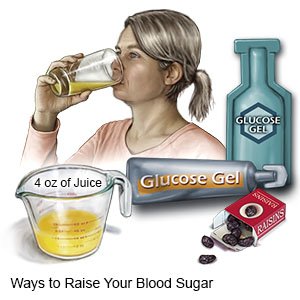What to Do If your Blood Sugar Is Low
Medically reviewed by Drugs.com. Last updated on Aug 4, 2025.
Low blood sugar levels (hypoglycemia) can happen with Type 1 and Type 2 diabetes. Low levels are more likely to happen if you use insulin. Hypoglycemia can cause you to have falls, accidents, and injuries. A blood sugar level that gets too low can lead to seizures, coma, and death. Learn to recognize the symptoms early so you can get treatment quickly.
DISCHARGE INSTRUCTIONS:
Have someone call your local emergency number (911 in the US) if:
- You cannot be woken.
- You have a seizure.
Call your doctor if:
- You have symptoms of a low blood sugar level, such as trouble thinking, sweating, or a pounding heartbeat.
- Your blood sugar level is lower than normal and it does not improve with treatment.
- You often have lower blood sugar levels than your target goals.
- You have trouble coping with your illness, or you feel anxious or depressed.
- You have questions or concerns about your condition or care.
What to do if you have symptoms of low blood sugar:
If you are sweaty, anxious, confused or have a fast, pounding heartbeat:
- Check your blood sugar level, if possible. Your blood sugar level is too low if it is at or below 70 mg/dL.
- Eat or drink 15 grams of fast-acting carbohydrate. Fast-acting carbohydrates will raise your blood sugar level quickly. Examples of 15 grams of fast-acting carbohydrates:
- 4 ounces (½ cup) of fruit juice
- 4 ounces of regular soda
- 2 tablespoons of raisins
- 1 tube of glucose gel or 3 to 4 glucose tablets

- Check your blood sugar level 15 minutes later. If the level is still low (less than 100 mg/dL), eat another 15 grams of carbohydrate. When the level returns to 100 mg/dL, eat a snack or meal that contains carbohydrates. This will help prevent another drop in blood sugar.
- Teach people close to you how to use your glucagon kit. Your blood sugar may be too low for you to be awake. People need to know when and how to use your kit.
Prevent low blood sugar levels:
Prevent low blood sugar by knowing what increases your risk. Ask your healthcare provider for ways to prevent low blood sugar levels. Any of the following can increase your risk of low blood sugar:
- Fasting for tests or procedures
- During or after intense exercise
- Late or postponed meals
- Sleeping (you may need a bedtime snack)
- Drinking alcohol if you use insulin or insulin releasing pills
Follow up with your doctor as directed:
Write down your questions so you remember to ask them during your visits.
© Copyright Merative 2025 Information is for End User's use only and may not be sold, redistributed or otherwise used for commercial purposes.
The above information is an educational aid only. It is not intended as medical advice for individual conditions or treatments. Talk to your doctor, nurse or pharmacist before following any medical regimen to see if it is safe and effective for you.
Further information
Always consult your healthcare provider to ensure the information displayed on this page applies to your personal circumstances.
